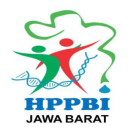Profile of Strategic Competence Education for Sustainable Development Based on Gender in Nature Schools
DOI:
https://doi.org/10.25134/quagga.v17i1.351Keywords:
Nature Schools, Strategic competence, Education for sustainable developmentAbstract
To advance sustainable development, competencies cannot be taught, but students must develop through experience and reflection to acquire action. One of the important competencies to be applied in education is strategic competence. The purpose of this research to determine the strategic competencies of male and female students at nature school. The method used was descriptive quantitative, the research subjects were Fathia Islamic Junior High School students with a total of 42 students. The questionnaire was used to measure strategic competence as many as 15 questions with positive and negative statements consisting of 5 sub-indicators to achieve strategic competence. The results of the study obtained an average of the calculation of the profile strategic competency of the percentage of ESD obtained from male and female students of 82.84% and 85.10% both in the Excellent category. The highest sub-indicator in male students was able to solve problems by 84.13% while female students the highest sub-indicator was able to provide sustainable innovation by 88.54%. This study shows that strategic competence in male and female students is in the excellent category.
References
Arwan, J. F. A. (2022). The Urgency of Climate Change-Based Education for Sustainable Development. Jurnal Ilmiah Pendidikan Lingkungan Dan Pembangunan, 22(02), 23–38. https://doi.org/10.21009/plpb.222.03
Chen, J., Kolmos, A., & Clausen, N. R. (2023). Gender differences in engineering students’ understanding of professional competences and career development in the transition from education to work. International Journal of Technology and Design Education, 33(3), 1121–1142. https://doi.org/10.1007/s10798-022-09759-w
Dannenberg, S., & Grapentin, T. (2016). Education for sustainable development - Learning for transformation. The example of Germany. Journal of Futures Studies, 20(3), 7–20. https://doi.org/10.6531/JFS.2016.20(3).A7
Eilks, I. (2015). Science Education and Education for Sustainable Development – Justifications, Models, Practices and Perspectives. EURASIA Journal of Mathematics, Science and Technology Education, 11(1). https://doi.org/10.12973/eurasia.2015.1313a
Hariyono, E., Abadi, A., Liliasari, L., Wijaya, A. F. C., & Fujii, H. (2018). Designing Geoscience Learning for Sustainable Development: A Professional Competency Assessment for Postgraduate Students in Science Education Program. Jurnal Penelitian Fisika Dan Aplikasinya (JPFA), 8(2), 61. https://doi.org/10.26740/jpfa.v8n2.p61-70
Kintu, M. J., Zhu, C., & Kagambe, E. (2017). Blended learning effectiveness: the relationship between student characteristics, design features and outcomes. International Journal of Educational Technology in Higher Education, 14(1), 7. https://doi.org/10.1186/s41239-017-0043-4
Kioupi, V., & Voulvoulis, N. (2019). Education for sustainable development: A systemic framework for connecting the SDGs to educational outcomes. Sustainability (Switzerland), 11(21). https://doi.org/10.3390/su11216104
Klarin, T. (2018). The Concept of Sustainable Development: From its Beginning to the Contemporary Issues. Zagreb International Review of Economics and Business, 21(1), 67–94. https://doi.org/10.2478/zireb-2018-0005
Liu, X., He, W., Zhao, L., & Hong, J.-C. (2021). Gender Differences in Self-Regulated Online Learning During the COVID-19 Lockdown. Frontiers in Psychology, 12. https://doi.org/10.3389/fpsyg.2021.752131
Novidsa, I., Purwianingsih, W., & Riandi, R. (2020). Exploring knowledge of prospective biology teacher about Education for Sustainable Development. JPBI (Jurnal Pendidikan Biologi Indonesia), 6(2), 317–326. https://doi.org/10.22219/jpbi.v6i2.12212
Nuhu, M. G., & Matsui, K. (2022). Gender Dimensions of Climate Change Adaptation Needs for Smallholder Farmers in the Upper East Region of Ghana. Sustainability, 14(16), 10432. https://doi.org/10.3390/su141610432
Purnamasari Shinta, Suhendi Fahmi Azkia Fitri, & Zulfah Nailul Leli Neng. (2022). Implementasi Education for Sustainable Development (ESD) dalam pembelajaran IPA di Kabupaten Garut: sebuah studi pendahuluan. JKPI: Jurnal Kajian Pendidikan IPA, 2(1), 105–110.
Purnamasari Shinta, & Hanifah Nurrul Aldila. (2021). Education for Sustainable Development (ESD) dalam Pembelajaran IPA. JKPI: Jurnal Kajian Pendidikan IPA, 1(2), 69–75.
Riess, W., Martin, M., Mischo, C., Kotthoff, H.-G., & Waltner, E.-M. (2022). How Can Education for Sustainable Development (ESD) Be Effectively Implemented in Teaching and Learning? An Analysis of Educational Science Recommendations of Methods and Procedures to Promote ESD Goals. Sustainability, 14(7), 3708. https://doi.org/10.3390/su14073708
Salam Angga, & Hamdun Ghullam. (2022). Penerapan Education for Sustainable Development (ESD) dalam Media Pembelajaran Elektronik di Kelas V Sekolah Dasar: Perspektif Guru. Pedadikta: Jurnal Ilmiah Pendidikan Guru Sekolah Dasar, 9(1), 161–172.
Sinaga, B., Sitorus, J., & Situmeang, T. (2023). The influence of students’ problem-solving understanding and results of students’ mathematics learning. Frontiers in Education, 8. https://doi.org/10.3389/feduc.2023.1088556
Sugiyono. (2018). Metode penelitian kuantitatif, kualitatif, dan R&D. Alfabeta.
Sund, P., & Gericke, N. (2020). Teaching contributions from secondary school subject areas to education for sustainable development – a comparative study of science, social science and language teachers. Environmental Education Research, 26(6), 772–794. https://doi.org/10.1080/13504622.2020.1754341
UNESCO. (2015). UNESCO’s contribution to the 2030 Agenda for Sustainable Development.
UNESCO. (2017). Education for Sustainable Development Goals: Learning Objectives.
UNESCO. (2020). Education for Sustainable Development: A Roadmap.
Wiek Arnim, Bernstein, M. J., Foley, R. W., Cohen, M., Forrest, N., Kuzdas, C., Kay, B., & Keeler L.W. (2015). Operationalising competencies in higher education for sustainable development. In routledge handbook of higher education for sustainable development. Routletge, 241–260.
Wiek, A., Withycombe, L., & Redman, C. L. (2011). Key competencies in sustainability: A reference framework for academic program development. In Sustainability Science (Vol. 6, Issue 2, pp. 203–218). https://doi.org/10.1007/s11625-011-0132-6
Wilujeng, I. , D. W. S. B., & Rauf, R. A. B. A. (2019). The Effectiveness of Education for Environmental Sustainable Development to Enhance Environmental Literacy in Science Education: A Case Study of Hydropower. Jurnal Pendidikan IPA Indonesia, 8(4). https://doi.org/10.15294/jpii.v8i4.19948
Wolgast, A., Tandler, N., Harrison, L., & Umlauft, S. (2020). Adults’ Dispositional and Situational Perspective-Taking: a Systematic Review. Educational Psychology Review, 32(2), 353–389. https://doi.org/10.1007/s10648-019-09507-y
Workman, J., & Heyder, A. (2020). Gender achievement gaps: the role of social costs to trying hard in high school. Social Psychology of Education, 23(6), 1407–1427. https://doi.org/10.1007/s11218-020-09588-6
Downloads
Published
How to Cite
Issue
Section
License
Copyright (c) 2025 Quagga: Jurnal Pendidikan dan Biologi

This work is licensed under a Creative Commons Attribution-ShareAlike 4.0 International License.









